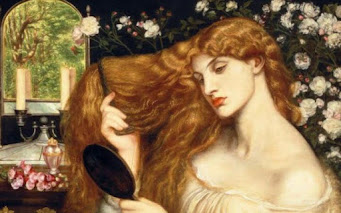FIRST REBELLION TO PATRIARCHY: LILITH
The word Lilith is believed to be derived from the Sumerian
word ‘lil’, meaning ‘air’ or ‘wind’ and it passed into Akkadian as ‘lilitu’.
Lilith, a feminine spirit or even a Storm Goddess, associated with the
destructive power of the wind and sensuality, evolved into a demonic character
who ensnares men with her allure and kills babies as patriarchal mindset
increasingly prevailed. She became a key figure in Jewish mythology and
demonology, hence she is regarded in Jewish history and literature as the
primary female adversary against the masculine monotheistic God, notably as the
first wife of Adam before Eve.
In Jewish and Christian history, she has been regarded as a
female demon and serpent, portrayed as the cause of the original sin and the
expulsion from the Garden of Eden. This belief is thought to have its roots in
the ancient nocturnal goddess Lilith. As the initial figure in the creation of
woman, Lilith is considered both the first wife of Adam and the devil who led to the expulsion
of Adam and Eve from Paradise.
The story goes like this; When God created Adam from the
dust, he saw that it was not good for men to be alone.
Just as he created Adam, he also created a woman from that
dust. Adam named this woman Lilith. Lilith asserting that they were equal to
Adam an even their creation was the same, refused to accept the pressure and
dominance he tried to exert over her. Believing that one form of superiority
manifested in sexuality, Lilith rejected Adam’s dominance, as they could not
come to an agreement and she insisted they were equal in every sense. Adam
argued that it was more appropriate for a man to be superior. When God sided
with Adam in this dispute, Lilith uttered the forbidden name of God and fled
from Eden. Upon Adam’s pleas, God sent three angels to bring Lilith back. God
instructed the angels to convey the message: ‘If she does not return, I will
kill one hundred of her children every day’. The angels found Lilith on the
shores of the Red Sea and pleaded with her to return but Lilith refused. Upon
hearing that her own children would be killed, she became an enemy to Adam’s
descendants. She swore that she and her children, who were also descendants of
Adam, would kill the offspring of Adam until the end of time.
With this story, the portrayal of Lilith as inherently
associated with evil has further reinforced the idea of her corrupted nature.
Jewish scholars depict in this narrative the image of a woman who desires to be
equal to man and rejects his dominance. Thus, gender inequality towards women
is supported not only by the difference in creation but also by sexuality.
Consequently, marriage becomes a situation where one asserts superiority over
the other rather than a companionship between equals of both sexes.
Due to the excessively negative and sexist perception of women in contemporary Jewish-Christian traditions, all ancient goddesses are being attempted to be revived with qualities akin to Lilith. On the other hand, Lilith has been brought up by the theistic feminist movement under the name of Shekhina as a sole goddess. Through this, Jewish-Christian women’s movements have strived to dismantle the patriarchal system that has long denigrated women due to their feminine nature. Understanding Lilith, presented as the female devil in Judaism, which fuels hatred towards women, is fundamental to understanding the ideology of feminism.
https://www.hindustantimes.com/books/book-excerpt-adam-s-first-wife-wasn-t-eve-but-lilith-here-s-why-they-broke-up/story-xqsev3SSBzd8XMyyXsGJHN.html
https://dergipark.org.tr/tr/download/article-file/455723
https://jwa.org/encyclopedia/article/lilith
https://www.learnreligions.com/legend-of-lilith-origins-2076660
SILA MEDETOĞULLARI
REGIONAL ANALYSIS COMMUNITY
POLITICAL SCIENCE AND INTERNATIONAL RELATIONS






Yorumlar
Yorum Gönder